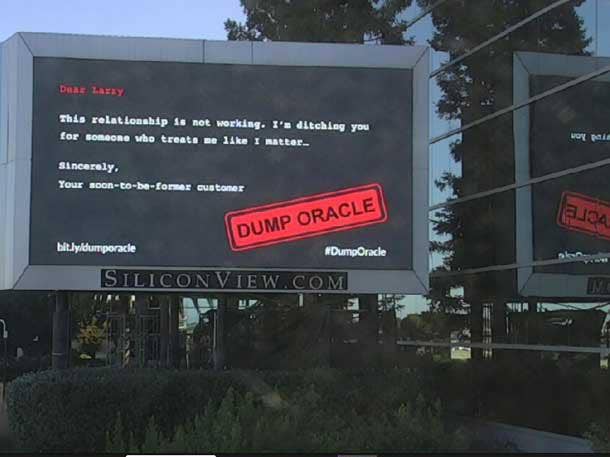MemSQL Launches 'Dear Larry' Campaign Encouraging Customers To 'Dump Oracle'
The startup posts 'Dump Oracle' billboards in San Francisco and New York attacking the database giant as an expensive and inflexible solution for modern workloads.

A week after Valentine’s Day comes National Breakup Day, and database startup MemSQL thinks that’s the perfect occasion to encourage customers to end longstanding relationships with Oracle.
The San Francisco-based startup is posting ads on billboards and kiosks in San Francisco and New York as part of an aggressive “Dump Oracle” campaign that aims to poach large enterprise customers from the database kingpin.
One of several billboards that went up Monday at the Caltrain station in San Francisco—a busy hub for tech workers—takes the form of a “Dear John” letter addressed to Oracle founder, Executive Chairman and CTO Larry Ellison. It starts, “Dear Larry,” then continues, “this relationship is not working. I‘m ditching you for someone who treats me like I matter…”
[Related: MemSQL Updates Its Next-Generation Database, Readies Partner Recruitment Initiative]
Two more billboards will soon go up in other parts of the Bay Area, including one overlooking a stretch of the 101 freeway near Oracle’s Redwood Shores headquarters. The messaging will also appear on kiosks in Lower Manhattan to catch the gaze of IT buyers for large financial firms.
Oracle declined comment on MemSQL’s ad blitz targeting its database business.
Peter Guagenti, the architect of the campaign as MemSQL’s chief marketing officer, told CRN that since the billboards went up at the San Francisco train station, he’s been inundated with emails from commuters.
MemSQL sees enterprises eager to close their Oracle accounts, Guagenti said, but, as National Breakup Day reminds, it’s not always easy to end a relationship.
Triggering the anti-Oracle campaign was the release late last year of MemSQL 7.0, which added capabilities that the company believed made its products a better replacement for systems of record. That latest version made it “a no-brainer for us in getting more aggressive in going toe-to-toe with Oracle,” Guagenti said.
The message of all the ads, and a supporting social media campaign, is that Oracle makes database deployment and operations more complicated and expensive to scale than it needs to be. Whereas five years ago there weren’t alternatives, a new generation of database vendors, grouped under the tag NewSQL, have created modern architectures with distributed compute and file systems that cost-effectively solve scale-out problems, he said.
Those systems are as scalable as second-generation NoSQL databases, Guagenti said, but maintain the capabilities and familiar structure of old-guard relational databases built in the 1990s. MemSQL was founded by former Microsoft and Facebook engineers who pioneered such technology.
Oracle is often the target of MemSQL broadsides because the startup sees a lot of its business come as an Oracle Exadata or Oracle RAC replacement solution, he said.
The database giant is vulnerable in the market because it hasn’t reacted to the demands of customers looking for faster and more affordable data systems requiring less administrative overhead and specialized hardware, Guagenti told CRN.
“The market is clearly moving away from them,” he said, noting analyst predictions that Microsoft SQL Server this year will surpass Oracle as the most widely used database. As users adopt more data-intensive applications, including applying predictive models and machine learning for greater business insight, they don’t want to incur the costs of scaled Oracle systems.
“You don’t see flexibility from Oracle as a vendor,” he said. “Oracle can increase performance through a number of techniques, but the cost/benefit is totally out of whack. It’s an architecture from another era, from the client/server.”
National Breakup Day seemed to his team like a humorous occasion to focus on “bad relationships that are hard to get out of,” Guagenti said. “This sounds like vendor relationships. You don’t have to be stuck in these vendor relationships if you don’t want to be.”